
Temple Kingdom of Kerma, Sudan, 3000 BC
There is an excellent introduction by Piere Vidal-Naquet, to Marcelle Detienne’s Masters of Truth in Archaic Greece.
He outlines the shift from myth to reason in the eras before Parmenides. The historic moment in which Kings disappeared but Gods remained. And following upon that a greater distance for man from what had been declared the truth, i.e., the King, an intermediary to the Gods. The germane issue though, is that truth, in a new poetics of speech had become enigma. A zone appears between truth and oblivion. Negativity is now a shadow border to the truth. “The ambivilance of efficacious speech in most ancient works of Greek thought, however, was preceded in the classical city by an ambiguity of action.” The city now debated political action. “From this point on efficacious speech lost its sovereignty, and dialogue could accomodate even the ambivalence of prophecy.”
Detienne outlines the evolution of cunning. The start of political language. And truth was that which triumphed politically. New categories such as deceit appear in dialogues. Most importantly, ambiguity had given way to contradiction.
“Ambiguity that had characterized discourse in the archaic period now took refuge in the facts”. (Vidal-Naquat).

Priest Renpetma, coated and painted wood, 900 BC
In Hesiod, the world was ambigious, in Thucydides the logic is one of contradiction. This was the new city state. And the city was modeled, in a sense, on the military. The grand assemblies. The first sculptures that depicted walking figures (says Vidal-Naquat), the path opened to fields of truth, where Aletheia came into view, or was capable of coming into view. This was the metaphorical clearing Heidegger was so obsessed with. There were secret paths, though, that led to oblivion and, deeper still, the “icy waters of memory”. This is as perfect a model as I’ve found from which to discuss originary ideas of art. Detienne, following on Vernant: “…in Archaic Greece three figures, the diviner, the bard, and the king of justice share the privilege of dispensing truth purely by virtue of their characteristic qualities.” They all share a similiar language and grammar. The echos of religious truth, the truth of the Beyond, that which is invisible, is the province of poet and diviner. The religious memory. The king’s realm is that of justice. It is the rule of law. It is to become legal speech and shed its oracular qualities over time.
Against these “truths” is the realm of oblivion, of obscurity, silence, and blame. To not praise is to relegate to the realm of oblivion. Silence shares its province with blame. And it is exactly here that I feel there are genuine issues relevant to understanding aeshtetics today. For there is a performative quality to “truth”, to the spoken discourse of truth. As Foucault said, the truthteller of archaic times was speaking by right, according to rituals. But it is also that a new secularized speech was granted a space. The Sophists, and logicians, and empirical philsophers. Language, speech, was now considered in terms of human interrelationships. Again, from within the Army came a notion of debate. The debate around military attack. There was an either/or quality built into this.
“Two major trends now developed in thought about language. One the one hand logos was seen as an instrument of social relation: how did it act upon others? …meanwhile the other path, explored by philosophy, led to reflection on logos as a means of knowing reality: is speech all of reality?” Detienne.
Intersecting here is the ritualized text found engraved on architecture, temples and stele. This was, of course, pronounced in Egyptian culture in the Pharaonic period. There was in these cultures, a sense of the power of statement engraved on ritual structures, in ritual space. What struck me about all this was the sense of a desire to speak the truth. The religious urge to monopolize truth was mediated by the new assemblies of political decision making. One of the ideas that Vernant, and then Detienne introduced was that it was important to examine a wide cultural system, historically, rather than just interpret a chosen few “great texts”. Paradoxically, perhaps, what followed was a deeper reading of all texts from antiquity.
Truth, at the time of Hesiod, meant that of which we are no longer unaware.
This is significant for understanding the double register of meanings that existed in the poet and diviner, and their speech. Memory, those icy waters of regligous-philosophical experience, is the regulator, the moderator of the desire for ‘truth’. The dream of forgetfullness held special significance in many early myths. The narcotic sleep, the forgetting. Truth was awaking, and remembering. We are no longer unaware, again.
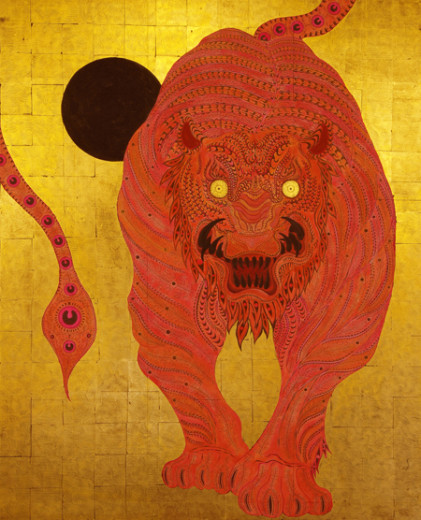
Tomiyuki Kaneko
The problem for many hermeneutists of archaic Greek texts is that they approach the texts from the dry language of science, a couple thousand years later. So that ‘lethe’ must mean simply unaware. It is the opposite of aletheia, which is truth, or usually, awareness. Or, true comprehension. And this isn’t quite right. Now, I’m not a Greek scholar, but one cannot miss the reductive qualities of many (especially English) classicists in regard to this. As Detienne points out, the outcome of this process of rationalist science when applied to Greek texts and theatre and sculpture is to dissovle into platitude. A kind of unawareness is not what lethe means, for it leaves out the role of mythic narrative, of Hera, who breathed a voice into in the poet Hesiod. Lethe and Hera, the divine powers of sleep and death, and of memory. These are the Children of The Night. There is a complex interrelationship between past, present, and future. And in the prophetic gifts of the diviner, and most of all in the complex deep processing of memory. For memory resided in the icy waters of the night, of sleep, and it made of its realm something that needed text, needed writing, to become performative. Deteinne points to the recent (forty years ago or so) discoveries of tablets, and of graffiti, from 500 BC, on the shores of the Black Sea, where is written ‘Truth -Deception’ and then “Peace-War’. There are also fragments about Dionysus and truth. For the purposes of this post, the point is that between the time of Hesiod and that of Paremenides, and then Plato and Aristotle, there were changes in the psychology of memory. The development of rational, positivist and logical thought, and with it, temporal divisions applied to memory. Secularized narrative was in the service of debate, and of social concerns. The religious/philosophical practices of the early writers and poets of Hesiod’s time, were being themselves forgotten. The advance of scientific proof corresponded, by default, to the construction of a reality. Things had to conform to reality to be “true” (of value). Truth was only verification.
For the ancient poets and diviners, speech (and song) were actions that triggered memory. Writing acted as process for memory. Song allows us to remember. It evokes memory. Now, the reason Greek culture is important is that Western notions of objectivity and rationality emerged out of this society and its artworks. The Persians had another system, but that impacted Islamic culture. The Chinese another. What interests me, being a Westerner, is what has been covered up over the centuries about the idea of revealing, or hidden truth, of mystery, and what this means for narrative and for art today.
This is not a grand historical survey, but only what seems to me a crucial but now institutionalized flaw in aesthetic values. It is in the most crude explanation, the demand for consensus or answer, for objectivity extended to everything. That even in the realms hidden from objectivity, the positivist sciences would apply anyway. Political (social) debate eclipsed revelation. The icy waters of memory, the muses of oblivion, were scorned. The translations of ancient writing were scrubbed clean of the Dionysian and of the mythic. Now, it was Adorno and Benjamin who recognized that traces of ancient depth could still be heard, and that most of all, there was still possible the creation of a space for accessing these realms of the Night. And it is within mimesis that this occurs.

NSC, Liz Sherwood Randall, Obama, bald head.
2012
The realms of the Night, of memory and oblivion migrated to and exist in the small uncanny interstices of narrative now. Shakespeare wrote in The Tempest, “The white cold virgin snow…”. The expected order would be ‘the cold white virgin snow’. Suddenly that line awakens us, briefly. The complexity of mimetic re-narrating, of furtive ideas that pop up unexpectedly in poems, these are the traces of the Ionian religious memory.
The power to decipher the invisible. “Thus memory was not simply the material basis for sung speech or the psychological function on which the formulary technique depended. It was also, and above all, a religious power that gave poetic pronouncements their status of magicoreligious speech.” Detienne.
The vast kistch product of the entertainment complex is in the service of denying the mimetic, of crowding out the space, the room, for wonder, for reflection, for memory. Memory is reduced to recitation. To the computer like accessing of files. What is valorized, besides the obvious Imperialist militarism and authority, is the idea of technological expertise. This is so pervasive it is almost impossible to find TV shows or Hollywood film, even in period settings, that are without it.
The zenith of the spiritually denuded language of Capital is the congressional or senate speech and text in the U.S. If one asked the average person about the NSC, or the goings on at the White House, or on any special council most would conjur up images from Sorkin’s West Wing , or from a thousand Hollywood films; dark corporate board rooms, but key-lit, with huge monitors and dark heavy oak tables. On the monitor would be up to the second drone photos, or closed circuit security images of some sort, or the face of a foreign leader on teleconferencing. The mood is somber, and serious. In truth, the rooms are corporate but hardly serious or somber. Most importantly, there is a banality to the communicative language. It is antiseptic but a bit generalized. It is the same language, really, as stock brockers use, as CEOs use, and as far from the songs of Orphic poets or from Egytpian scribes, or from Taoist philosophers as is possible. Far from the poets of the Rigveda, around 1800 BC, in the Indus Valley. In all the ritual texts of antiquity, one hears, in varying ways, the sound of the Daughters of the Night, the search for memory, the truth of which we should be made aware. Its worth mentioning that by the classical period, by the time of Plato, and Sophocles, the songs of the oracle were no longer a generating force for Attic culture. Already the art was there to praise the elite, the slave owners and propertied classes. What was born in the military debate was both objectivity, and democracy, however mediated, and the seeds of a rationalizing principle that would soon be part of a further class division and of a language of both flattery and power.
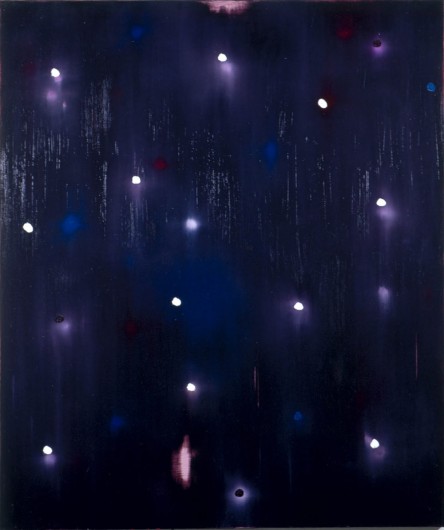
Ross Bleckner
The birth of realism in one sense. That is what you got by the end of the classical period. There was entire other cosmology going on in Persia, concurrent with Hellenic culture. In one sense, both were children of ancient Egyptian culture. The Persian, the Hebraic, and the Hellenic. The appropriation of Ionian culture by western Imperialist powers, was from one perspective, almost arbirtrary. But, appropriated it was, and it has left its fingerprints on modern consciousness. This is all beyond the scope of this posting. My concern is with the drying up and withering away of the prophetic and magical memory of antiquity. The realism that is now like a ball and chain on the consciousness of modern society, is that which explains, and even when it’s not explaining, it is discussing the goal of explaining. It seems possible that the inherent qualities of the positivist and hyper rationalist system that was already forming around the Platonic sensibility, leads directly to, down the ages, a broken repetitious and now solipsistic language of spare cateloguing, correlating, of equivlencies, and more significantly, a language that is shaped to accomodate the bourgeois notion of the individual, that has accomodated a defining of identity, and has evolved in both cause and effect with a specific reliance on a specific materialism.
In the case of the artworks of Western society, the almsot cultic need for individual authors, has directed a lot of the creative imagination of whole epochs toward an idea of speical individual perspectives, of genius, of hermeneutical examination of the gifted object created by this cultic master. That said, the individual voice seems to have always existed, and in a sense imprinted his or her individual search on the object created. The invention of cunning, corresponded to the rise of democratic debate within the soldier’s assemblies. Deceit, and language as a tool, as the creator of alternative fictions.
This week the U.S. government cut food stamps. Directly attacking the most vulnerable in society. It is sadistic, it is the ruling class exercising a contempt for people they still wish were legally slaves. The government claims there is no money for such things. Meanwhile the top ten highest earning individuals made over 100 million dollars each last year. There was additionally a protest at Barney’s in NYC; the ‘dont shop while black’ protest that saw many of those very rich entering Barney’s in great irritation that the riff raff were outside causing some delay in getting into to shop. Top corporations made billions and paid no taxes. Verizon, which might among the worst corporations in the world, paid no taxes and additionally imposed new salary cut backs for its workers. This is a landscape of shocking inequality.
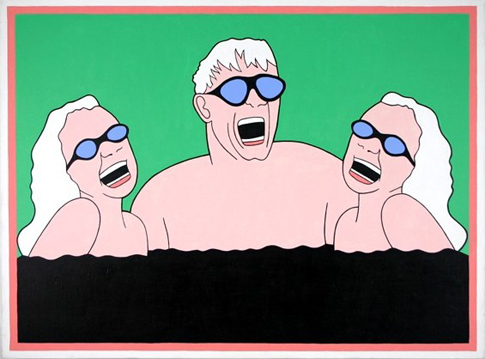
John Wesley
But one does not see network police drama in which a young man with Downs Syndrome is beaten unconscious for not understanding police orders, and you dont see the heroic police officer, decible meter in hand, sticking it out like a furtive flasher, to see if bongo players are too loud in the public park. Such acts of courage and bravery are not the plot lines of crime shows. The judge who recently was found guilty of texting the DA to aid the prosecution’s case is rarely depicted in network court shows. Or the various corrupt blood splatter analysts who helped convict innocent men and women, or the counltess, literally countless daily examples of police lying under oath in criminal courts across the U.S. The Obama corporate whore house (and I realize I am offending prostitutes with this) of legal advisors keeps the NSA machine rolling, and oh, meanwhile Glenn Greenwald’s partner and collaborater David Miranda is labled a “terrorist” by the UK government for practising journalism. These curtailments of press freedom are the not in any plot lines for Aaron Sorkin’s news show. No, what will continue to get is the sickeningly jingoistic and violence driven kistch of CSI whatever or a dozen other cop shows, and we will continue to get the Islamophobic and morally curdled melodrama of Homeland, and the puerile fantasy product created by the likes of Joss Whedon. Its worth a second to look, as an example of how media propaganda works, to take a show (doomed I suspect) from this season, Hostages. Based on a series idea by two Israeli writers, it was developed for U.S. TV by Jeffrey Nachmanoff, who can claim to have been the writer of the mind numbingly stupid Day After Tomorrow (but among the highest grossing films of all time). He also worked as a writer on Homeland, and was writer and director of Traitor, the grotesquely racist anti Muslim melodrama starring Don Cheadle (based on an idea by comedian Steve Martin). It is worth mentioning Martin, because the liberal class fawn over this well entrenched millionaire self aggrandizing hack as if speaking of Rembrandt. Rich, white, and liberal, the perfect ingredients for adulation, coupled to an inane and banal sensibility, but one that craves credibility, artistically. Because deep down Martin knows he peaked playing banjo with an arrow through his head. All of these projects have plots that reside firmly within this manufactured real of propaganda, and more, a manufactured real that is resolute in siding with characters of wealth. If an underclass character is given voice, it is to praise the rich who are helping him. Underclass characters (poor boys, usually, more often than girls) are seen as authentic in some way, sexier, but still, only representable if in the process of assimilation. The government is just a default setting for integrity. And while many plots forcus on flaws in this edifice of integrity, the resolution is always to patch up the hole, and return to normal, and normal is police state normal. But to return momentarily to Hostages. The premise of the show, as related by IMDB:
“Dr. Ellen Sanders, a premiere surgeon, is thrust into a chilling political conspiracy when her family is taken hostage by rogue FBI Agent Duncan Carlisle. Ellen and her family are held captive in their home by Carlisle, a desperate man doing the wrong thing for the right reasons, who orders her to assassinate the President when she operates on him. His highly skilled accomplices include his brother-in-law Kramer, whose loyalty to Carlisle will be tested; quick-tempered and intimidating Archer, an ex-military man with a razor-sharp tongue; and the only woman involved, Sandrine, a mysterious last-minute replacement to the team.”

Steve Martin
Now the absurdity of this premise is obvious. But to make matters worse, the series arc cant just be 24 hours, so the energy driving the show is spent in finding ways to prolong the absurdity. I suspect this show may even be too stupid for American TV. But the reason it is too stupid is that audiences retain a level of sophistication about probility, or what they deem “realistic”. So, this is unrealistic to the extent that everyone knows the Doctor would just go say something. There is no reason not to, because the implied threat is that they are all to die anyway. But what passes without comment is the construction of back stories. Various of the kidnappers worked for the U.S. military, worked on secret missions (against FARC for example, without ever examining the relative morality of FARC and Colombian cartels, and U.S. friendly fascist governments), or as is standard military back story, Somalia, or Bosnia. All of these real events have designated bad guys (Serbs in the Balkans, FARC in South America, or the generic terms Cartels, or African war lords, etc) and designated good guys (the U.S. military, and oh, on occasion the U.K.).
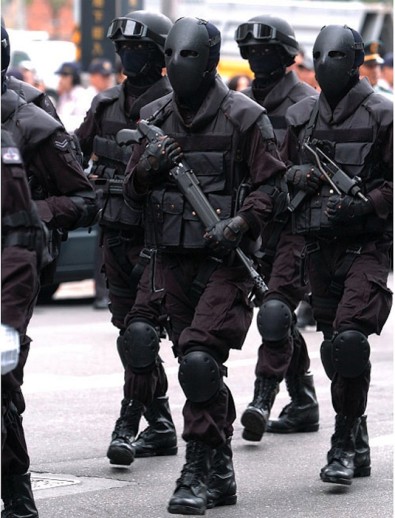
Taiwan police
These binary worlds, these officially “realistic” worlds, are remote, not just in the motiviations of these cartoon characters, but also in the more illusive language, both visual and linguistic, that serves to prop up these mindless storylines, and the ‘world’ that was created to allow its telling. So, to bring this all back to aesthetics for a second, I want to quote Norman O. Brown, from his late book on Islam:
“That urban revolution of 3000 BC was a managerial revolution. I mean those who do not work with their hands are management, and management is a problem.” Brown came to see two revolutionary systems, Marxism and Islam. One can see why this book regularly goes out of print. But it is interesting, if you know Brown’s work, for he is a searcher of prophecy and wonder. Of revelation. For Brown saw something lost in this transfer of privilege from seers and diveners, to managerial experts and politicians. In Gnostic thought, in Shi-ite Islam, and Sufism, and in ancient Hellenic writing, there is revelation, a perception of the divine and language and text were given over to capturing this somehow. Poets instinctively recognize this.
Paradise is a person
Come into this world
The soul is a magnificent Angel
Charles Olson
One hears this in Blake, and in Keats, in Neruda and Lorca and Trakl. One hears it in the mystic nuns, in Hildegarde of Bingen:
“…I set my hand to the writing. While I was doing it, I sensed, as I mentioned before, the deep profundity of scriptural exposition; and, raising myself from illness by the strength I received, I brought this work to a close – though just barely – in ten years. […] And I spoke and wrote these things not by the invention of my heart or that of any other person, but as by the secret mysteries of God I heard and received them in the heavenly places. And again I heard a voice from Heaven saying to me, ‘Cry out therefore, and write thus!”

Abandoned Soviet era movie theatre, Sergey Noviko photog.
That another register exists for language, and further for narrative. It is also feminized speech, and as I wrote last week, Adorno had said, the storyteller is always feminized, for it is always the mother’s touch. The Father and the Son is destruction, it is the bureaucrat, the reduction of wonder to a spread sheet, it is the dynamic of domination that follows upon this elimination of depth. The figure of the exile has cast a shadow across the 20th century and now the start of the 21st as well. Today, the global police force is preparing to contain and shape migrations of people that they know are coming and increasing in number. Fukushima and the radioactive spillage is catastrophic, but there has been an accompanying near hysteria that I don’t trust. For the oceans were already broken, and already millions of fish were washing up on shores everywhere on the planet, and already large mammels were dying of parasites and from starvation. The vast islands of plastic continue to choke off oxygen, and jellyfish populations are spiking, due to warming seas. Fukushima is only another catastrophe, and shifting blame to Japan (the evil orient) is too easy, and mystifies the global problems of pollution (which is not to say north Americans cant expect dramatic increases in bone cancer in coming years). The language of those men in suits sitting at tables in the White House, or in conference rooms of major corporations, is the language of the Father and the Son, it is the language with mystery removed, without memory, without dreams. Oblivion is not destruction. Theirs is the language of destruction. And the allegorical figure of the exile is now more potent than ever. For in the stranger as a narrative trope, the icy waters of memory can be found. Increasingly in corporate kistch, in Hollywood film and TV, the narratives build around figures of management. Lawyers, or doctors, or police. The police are not, of course, real police, but the police of technological mastery, and they are, significantly, the eyes that watch everything. Police are the extension of surveillance today. Not the other way round. The military operates its drones from air conditioned cubicles, dependent on “intel”, on surveillance information, and its a rationalized process of management. Figure out who fits the statistical model, and then incinerate them. Policy is statistic driven, and brutality the accepted accompaniment to this desire for control. Control is patriarchal, it is the death instinct, the end game that leads to extinction.
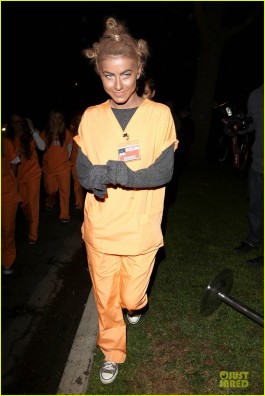
Julianne Hough in blackface, as Crazy Eye, for halloween, 2013
The few times the ‘exile’ is depicted, it is through the voice of the master. The voice is not just always white, but it is the voice of privilege. ‘Im tired of talking about me, lets talk about you, what do you think of me?’ Compliance, obedience, and deference to privilege is the prevailing sensibility, and that sensibility expresses itself in the most banal and “pragmatic” grammar. From the infantile offerings of Whedon and Abrams, to the creepy open fascism of Hostages and Homeland to the neo colonial Argo to the racist Orange is the New Black, the landscape is one drawn up by the ruling class. The racism that rises today is linked to cultural product. The use of blackface is ironic, it is fan worship, and all the more virulent for it.
Work does sneak through. Blue Caprice is a film I still think about, a month after viewing. For the narrative is deeply elliptical, and the police all but invisible. The mimetic contours trace something hidden, something fleeting, and their effect defies easy explanation. One cannot experience the film as entertainment, for it fails in a sense as entertainment. The narrative has expunged all effect of instrumental language. Visually restrained but poetic, the actors turn inward, the trauma inflicted on the underclass forms the backdrop. There is no valorizing of authority here, only the naked outlines of what social domination really achieves, and that is sickness.
Aesthetic resistance means learning to read the invisible. Learning to read that which is not entertaining. I have found myself, for a long while now, uncomfortable watching contemporary comedies. I suspect this has to do with the fact that the wrong quality of laughter is asked for in almost all Hollywood comedy. Jokes without conscience. Comedy is always based, to a degree, on cruelty, but when the joke forgets its own foundation, it becomes ‘only’ cruelty, then the redemptive dimension is lost. The suffering of the joke teller is lost. Comedy now is smug, it is self congratulatory, and it imposes a tacit nod of approval for a system that practices cruelty. Familes cut down from 500 dollars a month to 16 dollars in food stamps is the same identical ruthlessness that creates today’s comedies. It is contempt. The same contempt a B list actress embodies when she wears blackface as a Halloween joke.
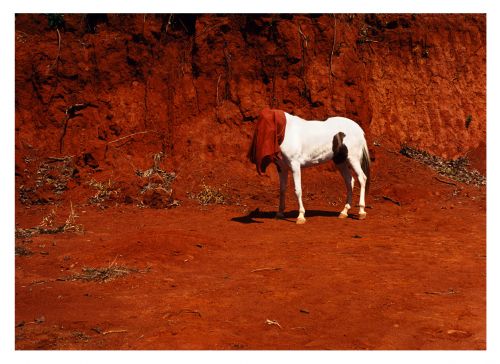
Laureano Toledo
“Even as bourgeois consciousness naively condemns the ugliness of a torn up industrial landscape, a relation is established that reveals a glimpse of the domination of nature, whose nature shows humans its facade of having yet to be mastered. This bourgeois indignation therefore is part of the ideology of domination. Ugliness would vanish if the relation of man to nature renounced its represssive character, which perpetuates, rather than being perpetuated by, the repression of man.”
Adorno
As a final note, its hard not to think about the Paleolithic cave drawings discovered in southern France, at what is now called Chavaux Cave. And Werner Herzog’s remarkable, but hardly flawless, documentary on the cave art (Cave of Forgotten Dreams). What strikes me, watching the Herzog film, and listening to the narration, is that the life of those ice age artists, from the Aurignacian age, 28,000 years ago, is impossibly remote. While the artwork is stunningly advanced, and sort of more emotionally realized than one can quite process, the impulse is beyond our language and thought to explain. For it is not about explanation.
Herzog remains a putz about a lot of this stuff in this film — most strikingly when he suggests a bear skull on a rock platform was religious, the rock an alter, and torch ash somehow incense. It is this sloppy new-age kitch notion of religion that reveals our (well, Herzog and many of the scientists interviewed, or how Herzog edited them) distance from those prehistoric artists. The world was empty, and it was vast and utterly unknown place beyond the small communities that clung together, hunted, and survived. The cave has only one partial human representation, and no landscapes at all. No trees, no rivers, no mountains. Only animals. The intimate awareness of animal life is acute, and suggestive of both menace and survival. It is hard for scientists; anthropologists and geologists, and speleologists, not to apply the language of today, of science today, of research and the lexical universe of specialized tasks. For the mundane observations of these scientists, and of anyone really, of myself, is disheartening in a way, for there is something missing, for all the genuine reverence that we feel, the wonder is oddly abridged, or circumscribed in some way. The little men, with little steps, on aluminum walkways, wearing coal miner’s helmets with lights, walk through the caves and somehow tell us very little. It is too far away. They had fire. They didnt have have written language. Well, so they say. They carved flutes, in pentatonic scales. http://www.nature.com/news/2004/041213/full/news041213-14.html So, in the vast dark ice age night, these hunter gatherer communities would play music, and draw. They didnt live in the caves where they drew…presumably….for there are no human bones. So it was a classroom for hunting studies. Whatever it was, the passage of time was unlocked, was detached from ideas of growth, or advancement, or progress.
There is also a sense of modern hubris. Perspective was not invented in the Renaissance. It was reinvented, as the art at Chauvet testifies (as well as some examples of Aboriginal art in Australia). The cognitive expanse one senses at work on these walls is oddly unnerving. Its all a continuum, a great cosmic mystery, and its likely the modern end point of “progress” is being reached at Fukushima, in the insanity of world leaders; the cackling madness of Hillary Clinton, or the dead warped disconnect of Obama, or the mentally squished David Cameron, or witless Francois Hollande, or countless others, countless sadistic ruthless intellectually and spiritually shallow leaders, crazed with pointless greed, with self hatred and a projecting of these emotional toxins outward into and onto a wounded planet… from Murdoch, to Geithner, to Rumsfeld and Cheney, and Bloomberg and to all the rest of the scum that has floated to the surface of the grand Imperial cluster fuck of history we find in 2013.
The single most telling and illuminating detail of the Herzog film, and the director’s best observation, was when the camera panned to a large horse and a small horse outlined in front of it on the cave wall’. Carbon data testing revealed the small horse to have been painated five thousand years later than the larger horse. For ‘that’ is what time must be like for man not burdened with history (not to sound too Nietzschean), or information, or guilt or expectations. Five thousand years. Change? No, there was another register or quality of human inventory at work, a great sense of infinite stability. A man came into that cave, five thousand years after the first artist, and saw that horse and drew something in front of it. Or..it was just ‘Im gonna get back and finish that drawing… in, you know, five thousand years or so’.
The photo at the top is from a civilization that formed around four to six thousand years ago. A black African society only now being excavated. A thumbnail description is here http://wysinger.homestead.com/kerma.html
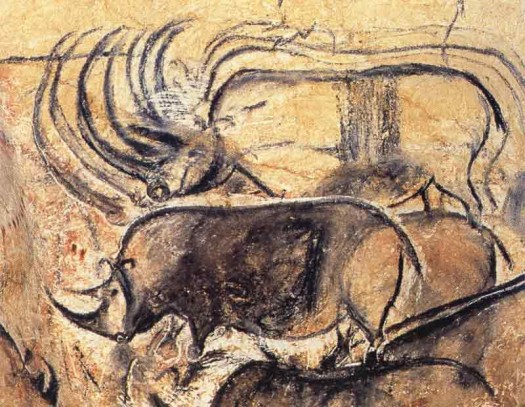
Chauvet Cave

Dear John Steppling,
I came here via your very, very, very welcome & timely post about the pseudoleft & liberal hacks’ shameless pissing on Russell Brand. (As if the coinages “brocialism” and “manarchist” weren’t cringe-inducing enough, they actually call that paltry piffling prattle a “discourse”! Discourse, forsooth! It’s a class thing. The impudent oik Brand is being put in his place, though thank god ineffectively. He’s one jack-in-the-box that won’t stay down.)
This is a fantastically interesting blog, which I’m just getting to know today, and what you write about the theatre and especially about acting has been as unexpected and as welcome to me as your dismantling of the self-appointed discoursers.
Thank you. (And Molly.)
P.
thanks patrick. And let me add, the ascension of just vile odious pseudo journalists like Laurie Penny, is highly problematic. For whatever reason she has venues such as new statesman and Znet and frankly, its baffling. This is a lightweight thinker and writer more appropriately stationed at TigerBeat.
And the Brand story remains fascinating. Far more than it should, probably.
You write:
“Aesthetic resistance means learning to read the invisible. Learning to read that which is not entertaining. […] Comedy is always based, to a degree, on cruelty, but when the joke forgets its own foundation, it becomes ‘only’ cruelty, then the redemptive dimension is lost. The suffering of the joke teller is lost. Comedy now is smug, it is self congratulatory, and it imposes a tacit nod of approval for a system that practices cruelty. Familes cut down from 500 dollars a month to 16 dollars in food stamps is the same identical ruthlessness that creates today’s comedies. It is contempt.”
Precisely. And the current neoliberal government of Great Britain is, of course, also plumbing new depths of sheer unabashed loathesomeness.
The very interesting thing about Russell Brand is that he appears to have reached the stage (actually long ago) where he would much rather risk being judged not-funny than being positively cruel in the routinely trivial style favoured — no, commanded — by the tenured & salaried bourgeois hacks. This is why he himself is now arousing such contempt (“adolescent ramblings”, “smart sixth-former”, “immature”, “new-agey”, “champagne socialist”, “woefully unrealistic”), such snark, and in fact such actual hatred. At the root of it all is fear, which, as Reich pointed out (to his cost), is the true opposite of love.
Emotional plague, as you say. An addiction to sitting. What they hate and fear is any kind of spontaneous movement, any kind of live or living action.
Russell Brand has been found guilty of being alive, and he’s still refusing to repent. If he insists on carrying on this way, and if he continues to attract such widespread support, I wonder what his eventual punishment will be. Like Giordano Bruno’s and MLK’s, it’ll have to fit the crime.
PS I commented at length (as ‘MacCruiskeen’) on Brand, Reich, etc in a thread I started here (now on its 8th page):
http://www.rigorousintuition.ca/board2/viewtopic.php?f=8&t=37360&start=75
It is wonderful how you span the gap from palaeolithic cave art to the politics and spectacle of the 21st century, and how you connect that original silence & emptiness to the current cacophony of dead corporate language.
Have you read any Alan Garner? His extremely spare & unsentimental Stone Book quartet is something I can’t recommend enough. The Stone Book of the title (of the first, 50-page, volume) is a prayer-book that can be read but not opened. The protagonist is a working-class, rural, provincial, female child who moves in a single day from the pinnacle of a church spire to the almost inaccessible depths of a painted cave beneath a mine. Her father’s words to her as the day ends: “That’s put a quietness on you.”
There’s no substitute for the entire tiny book itself, but this guy describes the first volume well:
—-
” […] So let’s look at the structure of the story:
The first half saw Mary come in from stone-picking in the fields, do house errands, then take her father his lunch. She was cajoled into climbing the high spire of St Phillip’s Church, to the very top. She rode upon the weathercock above her father as her father whooped.
The second half saw her and her father go down into the copper mines below Alderley Edge. They went down a deep shaft by ladder much as she had gone up the steeple by ladder: height and depth were equated by her father. At the deepest part she discovered alone the rock art, the mark used as her father’s mason’s mark, and the hand print no bigger than her own. This is significant: it is a space only children can enter (and was possibly painted by a child?). Once again, at the end of the book we heard her father whoop.
In both halves she discovered something of herself, and her inheritance: her father’s head for heights and his work scattered through the immediate area in form of churches. In the latter half she found the heritage of her ancestors under the hill, passed on from him and down the generations of her family. It was in effect a church under the hill. A church was described as stone around a lot of air in the first half; in the latter we see a lot of stone around a small place of air in the mine.
The book forms a very definite chiasmus.
The two halves are also bounded by Lord Stanley, local worthy, on whose behalf her father had just built the church of St Phillips, and whose mine would possibly in a few year’s time dig out the hidden cave, rock art and all. The centre of the book is an argument between father and uncle, rocking on the unspoken pivot of the strangle-hold Lord Stanley had on all their lives. […]”
http://michael9murray.wordpress.com/2013/06/01/the-stone-book-by-alan-garner/
Lord Stanley’s coat-of-arms appears in the book: an eagle holding a swaddled child in its talons:
http://medievalromance.bodleian.ox.ac.uk/The_eagle_and_child_and_the_Stanley_family
(Sorry, that last post was far too long. Feel free to cut it, or to cut the entire quote.)
not too long at all. And yeah, the attacks on Brand are relentless, and really, all he said was very simple and very obvious truths. Nothing especially radical but it shows you are not allowed to step outside a pretty narrow script. And the left, I mean that a sub literate like Penny gets published at Znet is rather remarkable. But look at Jacobin…an erstwhile leftist publication, which is firstly, on cultural matters, close to another fanzine…and which on political issues is increasingly and nakedly racist and reactionary. The recent drivil about the toronto mayor equated crack dealing with being hispanic. That was, i believe, the quote …..all under the guise of a sort of faux contrarian posture. ITs the fall out in a way from Zizek. This babbling childish prose, coupled to an increasingly fan oriented structure (In These Times and Mother Jones…the latter a bit less, but still….). If you read these leftist symposiums..’Dangerous Ideas’ etc…i forget what they are called…….richard seymour and penny and china mieville, and doug henwood……all of them in some places say cogent things, but over all their commentary is wildly reactionary. And part of this is a class division. Anyway…now I am rambling…..but to finish on Brand…none of these publications would ever defend Brand. Nothing is cool enough …. or hip enough. The insider posture that demands purity and to tick off all the boxes prescribed……there is a waiting lynch mob on anything that deviates, and then there is a waiting lynch mob for those who arent members of the cool kids club. That impulse to police….the lynch mob….is the heart of the reactionary.
One of the things that I see more and more (and perhaps it has always been this way) is the assignment of the mouthpiece to a writer like Penny, or Tim Wise, or even Chris Hedges. I mean, Brand is a white male, but apparently not enough so, and frankly Brand has a LOT to learn. I find myself intrigued by him because he is seemingly sensitive and interested in learning, because he has made an ass of himself many times over. But back to the Pennys and Wises and Hegdges of the world. They are ultimately thieves of the “discourse” around oppression, and in many ways are complete and utter profiteers, and not in the complex gotta survive kind of way. Wise os right now my nominee for the worst offender, but still….
John: “And part of this is a class division”
The whole thing, surely? The bourgeois-pseudoleft clerks and hacks and pundits (at least the Brits, whom I know more about) depend entirely on there being no-revolution. Their vested interests lie in indefinite sitting, in maintaining the status quo while simulating radical dissent — a necessary part of the advanced-capitalist entertainment spectacle. Hence their peeved/piqued/Bloomsburyesque response to that lippy foul-mouthed comprehensive-school upstart Brand, who has actually roused — moved — the proles.
Seymour – Ulster Ascendency & LSE, Guardian career burgeoning
Penny – Brighton College & Oxford, Guardian career beckoning
Musa Okwonga – Eton & Oxford, City solicitor & BBC football pundit
It’s no accident that Brand is a lowly thesp (kicked out of drama school after a year) and a **stand-up** comic. Russell Brand is, literally, unemployed. Also now very rich in bourgeois terms. So he neither needs to nor wants to make a comfy & prestigious sedentary living out of careful & prudent “discourse”. Instead, he has a life. And because he is now in a position where he neither has nor wants nor needs a salary of any kind, he is at liberty to understand (see Upton Sinclair) some very obvious things. And unlike them, he is free to act on that understanding.
No wonder they hate him.
I should say that Okwonga is the only one of the pundits who has come out of this with any honesty or courage, the only with the grace to actually acknowledge a mistake.
Penny and Seymour were happy to piggyback on his blackness for their tut-tutting about Brand’s “sexism” and “male privilege” while not even making it clear that Okwonga (their most favoured source, and not only theirs – Natasha Lennard’s in Salon, Eliot Sperbers’ in Counterpunch) was male too and decidedly more privileged than Brand.
@Lex…..yes, guys like Hedges are problematic. He has written some very good stuff, but he remains at heart a conservative. His position on the Balkans has always been bad.
And patrick..yes, yes, exactly. They have an interest in making sure the status quo is secure. And its nakedly elitist in this way they position themselves on certain subjects, and Penny of course is just odious at heart (her attacks on Fowler for example). But all of it smacks of this appropriation of story.,.,.,as Lex says, the theft of the discourse. And for me, of course, Im always rather shocked at the cultural misreadings…….seymour, proyect, and the rest……I mean its what this blog has been about to some degree. The strange wrong application of Marx to art.